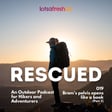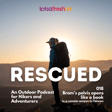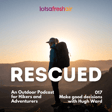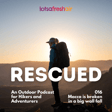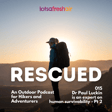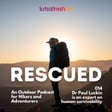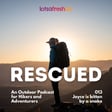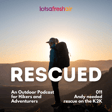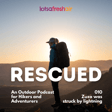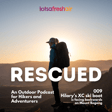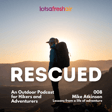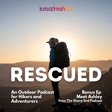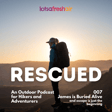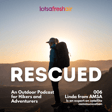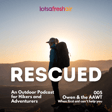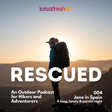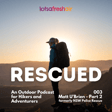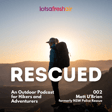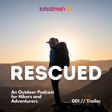Episode Introduction and Sensitivity Warning
00:00:00
Speaker
The following episode touches on subjects such as trauma, mental health and suicide that some people may find triggering. Please, take a sec and consider who's listening and that includes you.
Introduction to 'Rescued' Podcast
00:00:13
Speaker
And remember if you need to chat things through, please call Lifeline on 13 11 14 or visit beyondblue dot.org.au
00:00:27
Speaker
Rescued is a podcast of conversations with rescuers and those who've been rescued. It's about the lessons we learn about ourselves, the places we go and why, without judgment or shame, to help us have better adventures, manage risk and deal with the unexpected.
Meet Dr. Kate Batcher
00:00:47
Speaker
Dr Kate Batcher is a clinical psychologist specialising in trauma in high-risk or complex environments. Behind all her training and experience serving with the military and working in civilian life supporting critical incidents, she's someone deeply connected to nature where the wild place is her happy place.
Trauma in Remote Environments
00:01:08
Speaker
She joins me today and shares about the time she witnessed the death of another climber while on a mountaineering holiday to Mont Blanc. And how that event led her to develop models for dealing with trauma and psychological first aid in remote and rugged environments. She'll walk us through those models and give us some really practical tools on how we can deal with traumatic incidents. Should we ever come across them when out on our adventures?
00:01:35
Speaker
Thank you so much for joining me on the Rescued Podcast. Tell me a bit about the world that Kate
From Outdoor Adventures to Military Life
00:01:41
Speaker
grew up in. Were you an outdoorsy type person? Talk to me about the ways in which you connect to wild spaces. I grew up in the era where as a kid, you'd be sent out to play in the afternoon and you'd come home when the lights, the street lights turned on, or you'd be at one of the neighbor's houses and all the neighbor's parents would be contacting each other. So there was a lot of freedom when I was young to sort of explore and
00:02:07
Speaker
fall over and break things and just have space to create and play and be around others my age and not really have any idea what was going on. I threw myself into everything because I didn't know how to not throw myself into everything and that was that was academic to music to debating to sports to outdoor ed and by the time that I got to high school What I knew is that I gravitated to the outdoors and there was nothing in particular. There was no history of military experience. There was no history of like, we didn't go camping as kids and anything like that, but I started doing Duke of Edinburgh and I loved, I just loved being in the outdoors and I loved navigation and, but something about being outside and in nature always just made me feel calm and connected and safe.
00:03:00
Speaker
At the time, all I knew is that it felt right to be out there and it felt better than being in artificial lighting or with too many people or all sorts. So I completed all my Duke of Edinburgh and then had a gap year over in the yeah UK where most of my time was spent with their military cadets and doing treks and jumping out of
Psychologist in the Military
00:03:22
Speaker
planes. um I'm curious about the having never come from a military background. So you did the Duke of Ed and all you went all the way through that at school.
00:03:32
Speaker
How you end up with what you so you called military cadets then in the UK on your gap year. I knew that they they undertook experiences that I was interested in. And again, all I can say is at the time with no knowledge, no experience, it just felt right. It felt like I was being challenged. I've always felt nourished in nature and never in fear of it. I've always felt like when I'm in the bush, when I'm trekking or climbing or something just feels right. And I didn't have the words for that. And then, you know, at 18, when I went over there and when I did all that, I was out of my comfort zone, but everything that I did with them just felt like I was in the right place. It was the right time, not the right time, right place, like that sort of coincidence, but more somewhere in my heart. It was, this is where I should be. This is where I belong.
00:04:21
Speaker
Talk to me about going from being you know a student and a young person with all of these opportunities, and with that a lot of freedom, to then moving into a really structured military-style environment. What was that like?
00:04:39
Speaker
It was a very brutal transition. I'm not going to lie. I was out of my depth every day. All I knew is I was studying psychology at university. I was working and I was unfulfilled. You know, life was ticking along really well, but there was something that just, it was almost too easy and just superficial.
00:05:01
Speaker
So when when I got sucked in by all of all of the ads, I thought this is going to be an experience. And to be fair, I never, ever expected to stay in the military. I never expected to love the army. I thought it would be a really good experience in the short term.
00:05:18
Speaker
And how long was that short term for you? 15 years. Why do you think you ended up staying there for 15 years? The values, you know, who I am, what I believe in, serving the country. And the more that I, the more that I experienced, the more that I felt meaning and purpose from it. So does that mean you At this stage, and where you're talking about this 15 year career with the army, this is now no longer a reservist, is this correct? Or are you in the regular army? or So I spent almost five years in the reserves and then transferred to the full time so I could undertake this psych internship. And then I spent five and a half years in the full time and then I went back to the reserves so literally ADHD.
Return from East Timor and Ethical Challenges
00:06:09
Speaker
So five years reserves was learning and having fun and just a different world and the next five years was being professional. I think for me having the opportunity and the chance to learn what I am passionate about which is trauma and PTSD and first responders you know on the front line as opposed to just studying and studying and having placements and then going from there like actually learning it in real time was
00:06:37
Speaker
incredible and horrible and I hated it and I loved it and I hated it and I loved it but I loved it more than I hated it until I didn't and I remember I in East Timor I showed I didn't have to do this because of the brawl and whatnot but I chose to do PT or physical training with the soldiers the battle group soldiers every day and I love exercise so it was no issue um but it was a really good conduit to getting to know soldiers because if they see you sweating and and trying and failing, they suddenly think you're one of the team. You're not just in an ivory tower hidden behind air conditioning offices. You are actually out there and
00:07:18
Speaker
being messy and disgusting and all sorts. So those were the kind of things that then helped me build some rapport with the soldiers, where otherwise, I know previous psychologists, not all of them, but some of them had struggled because they're very in the office, you know, that sort of thing, whereas I was very messy outside the office. one of them So can I ask you in your practice over there, what kind of things were soldiers and I guess did you deal with staff as well? What kind of things were people presenting to you with? A lot of missing home and being away from home for a long time. It was quite tempo. When I worked with the senior staff, it was usually about politics, anxiety, stress, workload, all of those sort of things. But for me, it was really formative.
00:08:07
Speaker
because it was the first time that, I think I was 26 at the time, 27, it was the first time that I'd been a solo psych working overseas, having no idea what I was doing, really, and trying to integrate.
Transition to Civilian Trauma Psychology
00:08:21
Speaker
And my biggest focus when I went over there, you don't need to come and see me as a psychologist, but what I want you to do is feel safe enough to go and see another psychologist.
00:08:33
Speaker
So that was honestly my my my biggest my biggest goal personally was allow them comfort in then accessing support later on. So if we jump from coming back from East Timor, were you you were still in the army at that stage? I was still in the full-time army. I had a waiting list because there weren't enough resources. I had a waiting list of 160 people.
00:09:01
Speaker
And I was being pulled into management meetings and high-level meetings because I was doing boss's boss's job. And ethically, I couldn't sit with that because I wasn't i wasn't doing anything. I was sitting in meetings doing nothing and the people that needed help weren't getting help. So that's why I wanted to leave because I knew that if i if I was an external provider, I could at least provide support to the people who needed it as opposed to sitting in a lot of bureaucratic meetings and achieving nothing.
00:09:28
Speaker
But that's kind of the tipping point for me was like, can I do more good outside of the organization for the organization or within the organization for the organization? So was that, I guess, a launch pad for you to go into private practice?
00:09:45
Speaker
Yes and no. I left and I didn't know what I was doing. I had no idea what I wanted to do. um I thought I wanted to do clinical psych. I didn't know. I ah knew that private practice would be okay. So I then worked as a trauma psychologist throughout Sydney for a few months, which was enlightening. And all you hear is, this is happening here and this is a crisis here and this is a crisis here.
00:10:08
Speaker
I'll be sent on site to all those crises. But I've never experienced, I never knew there was so much batshit crazy trauma stuff that happened in the
Retreat and Relaxation in the Blue Mountains
00:10:17
Speaker
city. It was like a guy has just been squashed by a refrigerator in a factory. Go and sort that out. Or a woman has just been sitting in her car in a multi-storey car park at lunch and she saw someone, a body fall in front of her. Go and sort that out.
00:10:34
Speaker
a So can we, stepping away from your military experience, in terms of you just wanting to go back in a recreational sense and connect to wild places, was that something that you went to as your way of coping? but Always. I mean, it helps that I'm an introvert. And so, you know, being away from people, being away from humans is a lovely and very nourishing thing for me. I came here from Afghanistan and at but at that stage, I lived in Sydney.
00:11:05
Speaker
and came straight to the Blue Mountains. Every time that I've had significant stresses in my life, I've come straight to the Blue Mountains. Not the Blue Mountains specifically, but going to the bush, where my whole nervous system decompresses, where I feel like I can reconnect with nature, with history, with everything.
00:11:26
Speaker
and not have the chattering in my head or anything else. So we've heard about your military background, your free range childhood and how being in a wild place makes you feel and what it does for you. Talked about a particular experience about a time you went to just try and connect. It wasn't, you know, it wasn't as part of work or military and something happened.
00:11:53
Speaker
In, oh gosh, it must have been around 2011, I think, I went to Chamonix in France to learn how to mountaineer properly. The aim was at the end of that period to attempt to climb Mont Blanc.
Mountaineering Risks and Experiences
00:12:10
Speaker
It's a non-technical mountain, but it's also the most, probably the most popular mountain to climb in France because it's non-technical.
00:12:19
Speaker
It's like a long, hard slog uphill. So you get a taste of the goodness, but without having to have, but sorry, many technical technical skills. People who maybe aren't that familiar with different outdoor pursuits, can you just explain some of the skills that go into, like physical skills that go into mountaineering? So it's more than just walking up a really, really steep hill, isn't it?
00:12:42
Speaker
it is a little bit ah little bit of everything. So it is walking up a very steep hill, but you're wearing crampons, so boots with spikes in them. It's on snow and glaciers and rock as well. So it's a combination of different terrains. You're roped up with at least one other person for safety in case somebody falls. And there's quite a big risk of either falling in a crevasse or falling over the edge or rockfall or just ah a range of different risks that come with being high up in unstable weather conditions. So what kind of people are drawn to get into mountaineering? People who want to challenge themselves and be out of their comfort zone. People who want to connect with nature.
00:13:33
Speaker
Some people do it for ego because it sounds sexy. It's really not sexy at all when you're when you're actually doing it. It's the opposite, in fact. But it's a way to feel alive and in a world of comfort and convenience.
00:13:50
Speaker
there's something pure and raw and unfiltered about being up on the mountain. You can't control the weather, you can't control the conditions, you can't control what the mountain's doing, you can't control the rockfall. So it simplifies life and it forces you to focus literally on what you can control. And that in this world, the world which is so full of noise and chatter and busyness and all of that, it's it's simple and it's pure.
00:14:18
Speaker
So take us onto the mountain in Germany. Essentially, where I was up on a ridge and we could see opposite to another ridge, which we had to get across to. It was about 150 metres away. But to do so, you had to traverse across a very steep section where it's notorious for rockfall. And depending on where the sun is, how hot it is, that increases the likelihood of rockfall. So it's known as the most dangerous part of the actual climb of the mountain experience itself just because there's so much uncertainty and there's so many atmospheric changes that you have to navigate and particularly with climate change etc etc. So to get across you have to follow the old adage, slow is smooth and smooth is fast. You have to get across there very quickly but if you don't do it slowly and smoothly
00:15:10
Speaker
Again, you're at risk of just tumbling off or being hit by a rock or you know a thousand a thousand other things. How long and what's the the length of this this section? ah It would have been about 100 or 150 meters.
00:15:25
Speaker
So you could see the end. So there it wasn't sort of an unending thing. You kind of knew where it was and we were paced and obviously with a guide, we're all roped together. And in fact, there's actually some fixed ropes along there that you can clip into so that it sounds terrible. So that if you do get knocked off by a rock, you just spin around the rope rather than going all the way down. So it's the fact that that is there is quite telling in itself. um So we were standing up was myself a French guide and a climbing partner who I'd only met on that trip. We worked up together and we were standing on the first ah ridge line. As you do, I was just looking around and enjoying the view and we're having a bit of a breather and you know those moments where where you see something and it takes a few seconds to compute that you've just seen something? That you don't, you know, its something has just happened and you've just watched it peacefully and it's not until a moment later you you just think,
00:16:21
Speaker
ah dear god what about what but you know so it ah moment so I was standing there just daydreaming and enjoying the view and and being able to stop and actually breathe for a moment, which was also very nice. And suddenly over the other side, I saw a person who was in red.
00:16:39
Speaker
and it looked like they just fell and they fell a few meters and they were directly across from where we were but on the other side and they fell and they bounced and bounced and kept going down and then suddenly they ragdolled and they just and then from there the the pack fell off things fell out of the pack the body just kept going going and going and and right down the bottom until it it just hit in was in a pile down the bottom and it was I want to say I was shocked and I was shocked, but not in the form of medical
Cultural Perspectives on Death
00:17:13
Speaker
shock. It was just so unexpected. And I suppose because i'm I was such a beginner, I sort of assumed that wrongly, um assumed that it was quite sad. I knew the risks, cognitively knew the risks, but I never thought I'd observe that on that mountain at that time.
00:17:33
Speaker
So French guide, an exceptional technical mountaineer and alpinist. He called in helicopter rescue and it was in French and all that sort of stuff. And so we waited there while the helicopter came and it came and and this is the part that I remember as well. You know those, I can't remember what they're called, those games outside kids, out to the supermarket and kids arcades where you put in a dollar and a claw comes down and tries to pick up a toy.
00:18:02
Speaker
Yeah. That's exactly what it looked like. it Basically, it came in, there was obviously, i now no there was no chance that the person could have stayed alive, could have recovered or anything like that. um So they literally just went down and with this claw, picked up the body and flew away with the body sort of in the claw.
00:18:20
Speaker
like it wasn't people winching down and putting them in a litter. It was actually a mechanical. It was a mechanical claw that picked up the body. so it was It was body retrieval. It wasn't rescue. it was it and so I assumed that the guide had called in for body retrieval rather than for rescue. and you know With his experience, he would be able to know what is going to be a fatal fall or not.
00:18:41
Speaker
And what was the distance, do you estimate, that this person fell? Ooh, maybe 200 metres. And then, you know, and the other sort of things, you've just the clothes that had fallen out of the pack were still left and scattered and, you know, all sorts. So once the helicopter flew away, the French guy just turned around and said, all right, let's keep going.
00:19:06
Speaker
And the climbing partner and I were just befuddled by the whole thing. Can I ask, how long did that take from when your guide made the phone call? um Because I'm guessing you were actually in an area of coverage, phone coverage, until but the claw came. ah Less than five minutes. Oh, wow. OK. Really, really quick. And so we then went across the call bar.
00:19:32
Speaker
We locked ourselves into the safety that was there, the fixed ropes, and walked across. Thankfully got across very safely. And the friends, the climbing party, were still there, and what again, were just frozen. And we stopped. I sort of tried to speak to them, um and they weren't very communicative. And the guide, honestly, he just went past them and said, let's keep going, which is a very French thing to do. I've subsequently found out.
00:20:00
Speaker
um And so we kept going and, you know, very much on autopilot, just step after step after step. But the climbing partner that was with me, he went into a degree of actual shock and he shut down. um He was crying and crying and could hardly walk at times. And he he got to where we next needed to go, but with a lot of kind of cajoling from the guide to get there.
00:20:29
Speaker
The guy didn't stop and say, hey, this is this is what's happened and we're going to do this and then we're going to sit down and have some time and go through it and whatnot. Guy was just on a mission to get up to the hut. So we got up to the hut. I was still kind of just in my head thinking, what what have i what have I just seen? like what What is this guy doing as well? um And it was my climbing partner who again, once we got to the heart, he what we call psychologically decompensated. So he just fell apart, you know, in an actually a very normal and quite healthy response to something that we've just seen. That's something that was so unexpected to see. What subsequently happened was we stayed overnight, he went down the mountain with another group because he he just
00:21:13
Speaker
didn't, couldn't continue. um I went to continue up, but we, because of the weather change and things, I ended up, we only lasted another day and had to go down anyway, because of conditions. So we never summited, which I actually think is a good thing, because I don't think if I had got to the top of it, I don't think I would ever, I don't know that I ever would have climbed again, because it was just such a, it was felt, well, I suppose sacrilegious, really continuing on when, and not respecting and honoring what had happened. So I went back down and spent the next few days just in a day, just you know as baffled by what I'd seen, as and baffled by the guide's behavior and the general attitude
00:21:57
Speaker
towards death in the mountains, which is something that I hadn't considered before. I mean, I was still so brand new and I knew, I knew death happened. You know, you hear the stories, you hear about Everest all the time and the Himalayas, but to sort of see it like that so fresh and so early on and then to see the general, and it wasn't It wasn't rude what he did what the guy did he did everything right according to and he called in the rescue he made sure that his clients that we were as safe as possible and you know that that sort of thing but it felt it was a lesson in life in the mountains.
00:22:31
Speaker
literally, or death in the mountains. There's a little lesson in this is a real risk and a real danger. And there is a ah level of acceptance that high level mountaineers have that, you know, death is more than a possibility up there. It turned out that seven people died on that mountain that same week.
00:22:53
Speaker
because of condition, or one person just got blown off the side. The reason it actually, there is such a high mortality rate on Mont Blanc is because it's one of the most accessible mountains. So more people, more people climb it. It's not a technical mountain. So people take risks in, you know, atmospheres and environments that they don't necessarily understand the gravity of their
Processing Shared Trauma
00:23:14
Speaker
choices as well. So, you know, it's a the human element the human decision-making element as well as the risks of the mountain I think render it one of the more dangerous ones.
00:23:27
Speaker
so much in that just echoes, you know, people coming to grief on, you know, easy walks because ah they just think it's all they think it's going to be complacency part. And and also the the ego part that you mentioned before, it's like, oh, well, it's it's so non-technical. Maybe I can go without a guide. I've done a few trips. I'll be fine. Absolutely. Complacency stuff. Did you reconnect with your climbing partner when you were back down the mountain?
00:23:56
Speaker
Only briefly, I think we had, yeah, we had ice cream together. In in fact, just to make another weird little twist to it, um he was doing much better when he got down. I don't think he's mountaineered ever since. I don't think he's climbed ever since. He actually lives in Scotland up in one of the really remote areas. I actually know what he has. He's climbed Aconcagua, which he didn't enjoy, but he said was much safer than anything with snow or not. So I'm glad he did that. um it wasn't It probably wouldn't have been until seven or eight years later that he actually did that.
00:24:30
Speaker
Massive thanks for the support from the team at Patti Pallon, who since 1930 have been leaders in travel and outdoor adventure. In fact, did you know that Patti himself, a member of the Sydney Bushwalkers Club, was a volunteer in the original search and rescue arm of the Federation of Bushwalking Clubs in New South Wales? Huh, nice one Patti.
00:24:54
Speaker
This is a ah clinical question. when When someone witnesses something that is so horrific and that is they're not, haven't ever experienced before, what are some of the other things that people could exhibit
Understanding Trauma Impacts
00:25:09
Speaker
in terms of um physical, but then also what's going on emotionally and what's going on mentally as well for someone in that situation?
00:25:18
Speaker
I like to explain it like in the same way that I would explain grief. It's like being in a washing machine of physical, emotional chaos. And it's it's obviously different for everybody, but it can it can be ah anything from not being able to talk or not being able to shut up. um it can It can be you know, not an immediate or sometimes an immediate aftermath, but not being able to eat or potentially vomiting, um nightmares, sleep issues, forgetfulness, rumination, just playing it over and over and over again. um Obviously, it can lead to fears of own self mortality and kind of questioning about life decisions and and the big pick big bigger picture existential side of things.
00:26:04
Speaker
But it can generally look like honestly almost anything and the people anything is The right way to be responding because what's happening is the brain is trying to make sense of something that It shouldn't have witnessed And it also it can affect belief systems too. So if you have a belief that the world is fundamentally good and fundamentally safe, and that's shattered by what you've just seen, then your whole brain is in chaos trying to work through what just happened and has everything you've lived your entire life a
Creating Trauma Management Models
00:26:37
Speaker
lie. And what does this mean for life going forwards and, and, and, and?
00:26:41
Speaker
And so endless rabbit holes that it can go down, and then it can also be fear for family, even though family is not there. And then the the fear and anxiety spreads like wildfire. So that just feeds on itself and it and it keeps going. um But generally it can just anything. And it can even be things like dizziness and faintness. But honestly, it can be physiological um numbness in the body. It can be emotional numbness. It can be, you know, heat running up and down through the body. It can honestly be any gamut of any combination of any concoction of any shitty emotional and physical behaviors. And it might be nothing as well. That's the other thing. It's equally
00:27:25
Speaker
probably less healthy. And usually there's a story if somebody feels nothing or just responds to nothing, but some people will. Some people, because they've seen more trauma or because they process it in a different way or because their belief systems are slightly different. And culturally as well, how emotions are expressed is very different amongst different cultures. So it's chaos.
00:27:46
Speaker
is the best way that I can describe it. Chaos. So you came back from Chamonix. Did that experience play into any sort of further research or areas that you wanted to look at or um work that you've done?
00:28:02
Speaker
Absolutely. And in quite a positive way, um I came back and I thought, do you know what? The guide who was with us, who did everything technically right, but nothing emotionally right. He didn't do it out of nastiness. He didn't do it out of a lack of care, a hope. He did it out of a lack of knowledge and understanding because nobody's taught. And even to this day, even in guide training, future guides, aspiring guides, guides, they're not taught how to manage the psychological impact.
00:28:31
Speaker
Which is ironic given the whole role, their whole job, really, apart from physical safety, is psychological safety and human behavior. And no one's taught this. So I thought it's it's so simple it's so simple when you've been taught it when you know it. So that's, you know, it's always one of those things. But it's generally the skills to manage yourself and others are very similar to the skills that we manage other risk in as well. So I've done a fair bit of work since then on psychological first aid in remote environments and created with Survive First Aid, an organization down in Melbourne. We created a model um called the ACE model, which is exactly for managing a psychological, ah potentially traumatic event um and how to look after yourself and how to look after others. And, you know, a little bit because
00:29:26
Speaker
We all like frameworks and steps and tangible things to do. So that's a love a checklist. That's right. Life is so much. And particularly for a gray area, which is psychology, you know, thing is nothing is clear. and And we always say that with the training that we run with it is it's a really simple model. And the way that we we perform assessments is traffic light system. So there's nothing definitive at all. And half the time you'll find, you know, the traffic lights don't marry up and you're just making, you know, the least worse decision that you can the time with what you have. So the first thing, which is actually not part of the model, but in terms of managing yourself and supporting yourself, I would say the best thing you can do is know your own ugly.
00:30:08
Speaker
and know what that looks like. When you're tired, stressed, sleep deprived, have spent too many days in the wilderness or just, you know, the interpersonal side of things is getting really too much and tensions are there and just know what you're like. And it's never pretty. It is never pretty. It might be, you know, when things are really bad, you might turn into a snot monster or you might completely withdraw or you might be really, really snappy with people or, you know,
00:30:38
Speaker
you'll become very familiar with the gremlins in your brain. But, you know, just be familiar with them, know what they're like, know what happens to you. And then once you've and it can be quite a confronting exercise to do is it map out what your ugly looks like because it's raw and it's ugly, ugly, exactly right. But then also know what works for you, what you need. So if you're a person who needs a hug and some quiet time,
00:31:07
Speaker
know that. If you're a person who needs to be far away from other humans, you know and even if that's just walking 20 meters behind the rest of the group, know that. If you need music to distract yourself to change your mood, know that. you know any and There's no right or wrong because it's whatever is right for you that helps you feel safer and um change some of the mood that you're in. And sometimes it's it's just as simple as food, you know, that is always a good thing. but But at the same time, some people might want to vomit if they've seen something. And so again, knowing you're ugly, but knowing what works to help you feel better.
00:31:45
Speaker
And before you go out on a walk, or sorry, an expedition, a mountain, a canyon trip, what whatever it happens to be, also plan for what resources you'll have while you're there. So if you're a person who, to feel better, needs to ah listen to music, but you're in a wet canyon, it's not going to work so well. You know, if you're a person who needs to ring someone specific and debrief with only that person and you're far away and there's no cons,
00:32:15
Speaker
that's not going to work either. So you kind of plot down what, you know, and you're ugly, what you need. and what you'll have access to when you're out. And then from there, you can you've got a plan as to if something happens, this is what I can do because I've got that there. So you're not kind of trying to scramble for solutions when your brain is so hyper aroused with stress, with potential trauma. You'll never come up with a solution then because it's literally the limbic system is switched right back on and you're in lizard brain.
00:32:47
Speaker
You know, you're way back as a mammal. You're way back but before thoughts and words and solutions can come to the forefront. So have that as part of your risk management plan. You know, the personal risk management plan.
00:33:01
Speaker
So good. So good, Kate. But so simple. so And also it's everything that we do for physical things as well. It's exactly the same sort of process that we know. you know if you if you If you're going into an area where there's a risk, ah if you've got even, for example, um a bad ankle.
00:33:20
Speaker
you know think about what you're going to need and what you're going to have and what you can do and put that into your first aid kit. Those sort of things. So it's again that, but just on ah on a personal, and emotional sort of level.
Introduction to the ACE Model
00:33:31
Speaker
Is there anything more on on the personal side that we can do to set ourselves up for success if trauma happens you know to to us or to our group?
00:33:43
Speaker
Absolutely. There's it's quite a negative... Well, it feels very negative planning tool that you can use. um It's worst case scenarioing. Love it. And then what happened? And then what could happen? And, oh, it just gets worse and worse. Okay. And then you get to the very end and you go, okay, there's nothing worse than this and we have a solution. But you also go, okay, if this happens, what am I likely to experience psychologically, emotionally? What do I need to do? Okay, what solutions do I have for that? Okay, what happens if this happens and it's significantly worse than that? What do I have access to? What am I likely to experience? How can I manage that? Bang, bang, bang. And if you've... The brain works brilliantly with expectations and expectation management. So you're not you know not preparing for the certainty that it will happen, but what you're doing is help mitigate the possibility that it will happen and also mitigate the severity of the impact it might have on you if it does happen.
00:34:40
Speaker
So that's actually a really good exercise to do for all things that, you know, you're worried about or scared about or there's anxiety and around and things. And because often when you do work, write down the worst case scenario and the realistic worst case scenario, then you look at and think, I can, in the moment, I can solve this. I do know what to do. And somehow that's very empowering as well. So that when you set off, you think I planned for all these ridiculous outcomes, hopefully none of them ever happen. But I'm now confident that I've got some mechanisms to move forward and manage it.
00:35:09
Speaker
So good. So good. The other thing that we have developed, as I mentioned before, the ACE model. A-C-C-E. It basically means if you go through the follow the bouncing ball, the first step is assess. So stop what you're doing, obviously. Take a few breaths. Pause. Slow down.
00:35:33
Speaker
first. What we do when we're stressed and anxious is speed up. So make sure you stop and slow down. ah Sit down if you need to sit down. And there's three assessments that you can run through. Assessing the individual and that's assessing the person who was hurt. It looks at, you know, what their behavior is. Is their behavior congruent with what happened? You know,
00:35:57
Speaker
Did they witness something and they've fallen apart or did they not witness something and they've completely fallen apart like what's actually going on. How intense or how severe do you think their emotional response is and that's your perception of what's going on for them a lot of this is very subjective.
00:36:13
Speaker
you'll put them on a traffic light system of green to red. You know, are they closer to red where they might be completely shocked, unable to speak, almost paralyzed, unable to move, or you can't even communicate with them because of the distress is so high. All the way to green, which is still functioning. Are they closer to being fine or are they very not fine? And that's the two ends. And then there's more letters after that. Where do we go after A? Then we go into practical stuff because assessing is great, but what do you do with that? So the next, it's assess, calm, communicate and evaluate to evacuate. So calm is essentially taking some time to be with the people who are really distressed and helping them to their nervous system to settle down a bit.
00:37:01
Speaker
And there's many different ways that you can do this, but really, really simple ones is sit with somebody and let them experience the emotions and do deep breathing with them. Just help them regulate their body by slow, deep breathing. And often, you know, once you slow your breathing and you slow your nervous system, it slows your brain down. And so your brain isn't as chaotic as the initial part, the initial initial response. And it's you know it's it's not a solution, but it does help in the situation to then be able to make some decisions. As we know, a lot of a lot of chaos and a lot of high emotions just makes things significantly harder.
00:37:46
Speaker
And not great for decision making or planning or being anywhere useful.
Coping Mechanisms after Trauma
00:37:53
Speaker
Absolutely. So breeding, there's an exercise and called grounding, and it's some people may have heard versions of it, but the one that I like to use because it's very nature focused is you sit down with somebody and you can do it by yourself but it's it's nicer if you're doing it with somebody because you're doing it out loud as well and that seems to consolidate it better but identify four things that you can see four things that you can hear and four things that you can feel not emotions but tactile stuff like I can feel the wind on the breeze on my face um and so you do four and then three
00:38:36
Speaker
then two, then one of all of them. And it forces you to be out of your head because you're observing and you're noticing and you're not in your thoughts. You're literally trying to identify these things out here. And in doing that, again, you're slowing your brain down.
00:38:51
Speaker
And the other one is distraction. And it's what guides often do and we all do in the outdoors, which is give someone a job to do. you know And sometimes it's it's like having a third belayer that doesn't need to be there. you know You're trying to you know give someone something to focus on and to feel important and to feel like they're part of the solution as well. And it might literally be, can you go and set up that tent?
00:39:13
Speaker
Or can you go and sit with a person, if someone's very distressed and someone's not so distressed, it might be go and sit with a person who is distressed and ask them about their favorite holidays. Probably not the holiday they're on right then, but, you know, ask them about things that they might be interested in. And you're literally, again, just trying to distract them from what's going on around them and from their head. They're that they're the quick and easy ways to come hopefully help to calm somebody down. And so after calm, what's our what's our second C there? Communicate. And it's it just how best to communicate with somebody who's in shock and distressed. And that's by speaking to them clearly, loud enough that's not shouting at them, um but it is yeah and and making sure you're speaking to them quite slowly as well. Again, brain is everything will speed up when you're in that situation. So intentionally slowing
00:40:08
Speaker
the pace of your speech down, which will make you feel very awkward and uncomfortable, but it really helps the other person to focus and to listen in on it. Just enough that you can reassure them that they're safe, that the situation's under control, and that it's being managed. So good. Can I just make an appointment for any time that I'm in a group where trauma is is experienced, unfortunately? Can I just book in? Can I just make sure you're you're there?
00:40:31
Speaker
I'm around, yep. But we laugh, like that's literally what I do. ah This is kind of my specialty, either you know either in the wilderness or just... in normal clinical practice as well. I think with trauma, a lot of it is just understanding what you're going through and knowing that what you're going through is horrible and a little bit terrifying, but normal and healthy and adaptive. and If you know that, then it reduces the fear of, I'm going to lose my mind. I'm broken forever. What's next? What's next? What's next? If you kind of expect
00:41:02
Speaker
You know, one of the things that we'll go into after this, but if you beforehand, if you have an expectation of not just what your ugly is, but what trauma chaos could look like, then when you hit it, you're like, okay, this is awful, but this this is part of the process. It's simply part of the adaptation process to what's gone on. So it's not unsafe.
00:41:26
Speaker
Do you have a personal story about an incident or time during an outdoor trip when something didn't quite go to plan? Maybe you got lost, injured, let down by some gear or something else. Look, honestly, it can happen to any of us at any time, regardless of how experienced we are. And it's by sharing these stories that we can all learn and help avoid them in the future.
00:41:49
Speaker
If that's you, I'd love to hear from you. So please drop me an email to rescued at lotsafreshair.com. That's L-O-T-S-A, freshair dot.com. Take us to the E, Kate. Take us to the E in the acronym.
00:42:06
Speaker
So the E is evaluate to evacuate. And what that means is doing one more quick assessment. And that is doing a renewed quick assessment of the individual who's is at most harm.
00:42:22
Speaker
Because you're obviously an amazing communicator and have calmed them down beautifully, maybe they've now gone from the red to the yellow. Maybe they've gone from the yellow to the green. Maybe they haven't. Maybe they're exactly the same. But if they have if there has been any a change in their psychological state, that's when you can go, okay, now I can properly evaluate whether this person and this group can and should continue or whether we should all leave. So giving them a chance.
00:42:51
Speaker
And if they're obviously in the red and nothing has changed and the group and the um environmental assessments won't change either, so it's mainly just reviewing the the individual one, then you can make a decision. You know, green, good to go, red, not so good.
00:43:08
Speaker
Most of the time you'll end up somewhere in the middle, which can be veryt very frustrating, but it's not too bad because say if you're um orange to red, we'd say evacuate, ultimately. um If they're less than that, we'd say can stay in position and monitor.
00:43:25
Speaker
And if you choose to evacuate, there's a nice little handover that you can give, which is the same. It's pretty much similar to the I missed for the ambos. And if you keep them in place, then the next step is to monitor them and come up with a bit of a plan. So that's just, again, checking in with them as regularly as you want to. It might be once a day, might be once an hour. If it's once an hour, they probably shouldn't be there, if that's what they need. um But monitor them and know to see what obviously what the trigger was, but also what worked? you know Did it work? did Did the breathing help? Did the grounding help? um does talking Are they more comfortable if they if they're allowed to just talk and talk and talk and talk? What works? Write that down into a plan.
00:44:10
Speaker
Once you write it down or put it in your phone or anything like that, then you go, cool, every day I'm going to check in about this. And also every day we're going to be breathing together. Or, you know, it might be you're really good if you've got something to do. So, you know, you can be the navigator for this, but I'm still going to check in with you all the time and we're still going to be breathing and, you know, and all those other things as well. So that's essentially it. If you decide to keep going, just have a little bit of a plan to keep an eye on on the situation because it can change at any time.
00:44:40
Speaker
um And if you're evacuating, if you're finishing or getting let just say getting rid of them, that sounds awful, but if you're choosing to leave, or somebody else is choosing to leave, then that's it. You do the handover and and there. But it's almost after that fact.
00:44:57
Speaker
after the event, after you've done the potential evacuation, after the monitoring, when you actually stop and allow yourself to decompress. That's when other things come out. And it's very, very common for people to compartmentalize and to cope through the event. But when they get home at the end of the expedition, start to just not feel right or they can't sleep properly or, you know, things just aren't settled or concentration is a bit out of whack.
00:45:26
Speaker
feel a bit off and that's when it's really good and again I've got a really lovely flow chart, I call it the sexy flow chart because it's very pretty, um about when to seek professional help and when these things are normal. So for the first two weeks after an incident it's really normal to be responding and have all these symptoms and all these chaos to varying degrees.
00:45:51
Speaker
completely normal because your brain's adjusting, adapting and going from there. Really shitty, but really normal and quite healthy. From two to three weeks, they should start to reduce in either severity or in number of different things. And particularly if you're doing the right things by eating, sleeping, exercising. Three really simple things. If you can get those ah back to your pre-expedition routine, that helps, it helps your body to trick your brain into knowing it's safe.
Discussing Trauma and Readiness
00:46:21
Speaker
and things are normal and you're in the normal routine. So it lets it kind of unwind and and helps to process what's happened. After three weeks, if nothing has changed, consider seeking help, professional help.
00:46:32
Speaker
um either through a GP, through a psychologist, um and even just informally with a friend or a peer who hopefully will then say, go and see somebody else, or let me come with you to just, yeah, just make a call. um And that's it. And sometimes it just requires one or two sessions with a site to help that further along. But the reason, if if it gets to four weeks and things aren't right and they're not improving, or they're getting worse, um they're if so they're improving a little bit, that's fine. But if they're not improving at all, definitely seek help.
00:47:02
Speaker
Four weeks is when PTSD can be diagnosed. And it doesn't take a lot to potentially mitigate that outcome. And if we can address it when it's early on, then know people don't often see psychologists until they feel broken, ultimately, so far gone. And then it's so hard to come back and it takes so much more time to heal and recover from it. Whereas early intervention, and that literally just might be, am I okay? Am I losing my brain? Is this normal?
00:47:31
Speaker
Sometimes that's enough for for recovery and just that safety that comes with it. So after an event, just notice how you're going for the couple of weeks and be gentle with yourself. Do good things that are for you. you know If you want to talk about what happened, do talk, but only talk to somebody you trust and only talk when you're ready.
00:47:52
Speaker
Okay, don't be forced to talk about it. um If you're forced to talk about it and you're not ready, and it's with someone you don't trust, again, that's just gonna cause more harm than good. And we know that because in fact, so many many for many, many years,
00:48:04
Speaker
best practice trauma model was talking about an incident immediately afterwards. And they found that that actually caused more trauma than reducing trauma. and it was like And it was a group model because what would happen is you'd talk about it and then you'd hear everybody else's version of it. So you're just being re-traumatized by their version on top of yours as well. So talk when you're ready and when you feel safe and to somebody that you feel safe with. And that actually might just be your dog. Sometimes they they are the best listeners and the warmest, most judgment free companions.
00:48:33
Speaker
especially if you've got some treats. Exactly. Exactly. and you know You're going to be a snot monster and crying and they're just going to be loving you anyway. Yeah, I love that. so Everything you've talked about has been is fantastic. so That ACCE model that you developed. Now, I've been thinking about this in terms of witnessing trauma, like a physical trauma, like you mentioned, you know a bad fall, a bad climbing fall.
00:48:58
Speaker
or even, let's say, you're out on a hike or a bushwalk, something like that, um someone falls down slips slips down off of a bit of exposure, that kind of thing, or there's a broken bone, there's you know there's something physical. Does this same model, can it also be applied to somebody having a psychological emergency, um a mental health emergency in a wilderness setting? Yes and no. So what I've described so far is psychological first aid, which people often mix up with um mental health first aid. Mental health first aid is different because it's somebody who has a pre-existing mental health condition. Now, this model can be used if they've got a mental health condition and there's
00:49:45
Speaker
whatever happens and it all comes out when they're in the bush, because it always does. um a a set But especially the know you're ugly and know what you need. I would say with a mental health first aid side of things, and I've actually written a chapter in a book that's being published shortly about about this, is understanding the illness, the mental health problem, how it manifests for you, when it's likely to manifest for you, all those sort of things, and share that with the group as part of the planning.
Mental Health in Wilderness Settings
00:50:12
Speaker
This is who I am and this might happen and I'm gonna be messy and this is my ugly and when it comes out that's this. This is what I need at the time but if it gets more severe this is who you need to call here here here.
00:50:24
Speaker
you know, at at this stage, you can use the assessment model to see how severe it is. And and again, um and the impact on the group and can the group continue or is that person, um is their current situation impacting the whole group too much? And again, that's when the evacuation should happen and that's what evacuation so should happen. So yes, it can absolutely be used for mental health,
00:50:48
Speaker
conditions that come out um but it has it was developed for what we call critical incidents. So I think the best thing for the mental health condition side of it is usually it's stabilization and support and that's different for every person and any different mental health condition that it is. you know Very different anxiety to very to depression, to if trauma, they've got pre-existing trauma and that comes out. But they'll usually know unless they've suddenly developed a condition while you've been out there, which is uncommon, but does happen. um There's very little that you can do for somebody because you can't give them medication if they don't, and if they didn't bring their own medication, well, that's very bad on the on their part. um So the best thing you can do is keep them safe, keep them stable and get them out.
00:51:33
Speaker
get them to a professional who needs to do that. So very similar, just basic first aid of stabilization, safety, and if it's beyond your scope, um and if it's just the two of you and you have no idea and they haven't given you any of that information, then evacuate immediately. Because what we don't want is an escalation of symptoms to the point where there's gonna be harm. And that can actually be suicide, or it can be, you know, if psychosis comes out, there's very big dangers in there just because of the physical risks that are gonna come with that. And that's not gonna calm down. That is evacuation, medication, and inpatient treatment. So that's ah really, you can you can absolutely use this, but if somebody's got a mental health condition, um
00:52:17
Speaker
It is very, very helpful for them to be open about that, which a lot of people are worried about because of shame or stigma or, you know, or anything. And the worst part is it's likely to be exacerbated in the wilderness because there are so many factors outside their control. So many changing circumstances, remoteness, challenges, heat, cold, like all these things that can really destabilize somebody who is you know on the fragile end of stabilization. So really, I'd say just try and evacuate if you're worried.
00:52:51
Speaker
Yeah, and and coming back to what can we do to set ourselves up and our our group, our friends, for success. you know Quite often, you might say you're you're walking not with a commercial group. You might be, you know you fill out a medical form if you're going to go, say, trekking overseas or something like that. So if you're out walking with friends, um maybe if it's in a bushwalking club, I know usually they'll have like a you know fill this form in to sign on to the walk. And you might say, you know oh, I've got a but bodgy knee and, hey, you know, i'm I've got a peanut allergy or that kind of thing. But I think, as you say, there's this traditional stigma, which we've really got to get away from. And we're getting better, you know, society. We're getting are definitely getting much, much better. But to say, you know, to include in that your mental health issues that that may or may not be relevant seemingly at the time. But if you're a leader of the group, having that kind of information and especially knowing what you said about you know these wild environments can exacerbate or can sort of heighten um symptoms of some of these things. If you're the leader, oh my goodness, so good to know that.
00:54:02
Speaker
And not so you can say, oh, you're not coming on my walk. But so you can say, hey, if if you're coming on this walk and something starts to change or I notice something, at least I know where to start the questioning and how I can start supporting this person i to keep them and the group safe.
00:54:20
Speaker
and The reality is, if there is those those conversations that happen early, early on or beforehand, and then then again, it's it's a similar sort of thing about early intervention. It often won't get to crisis point. and They might not have to evacuate. you know It might just be, hey, we'll just keep an eye on this. and Do you need, what else, how else can we support you to stay safe and get you through this? It shouldn't, mental health conditions shouldn't be a reason to not do something. They just have to be included in the management of a situation.
Training for Mental Health Emergencies
00:54:50
Speaker
But on that note, what's, what is one of the things that I am passionate about and working towards? um It's one thing to write on a form, I have anxiety or I have panic disorder.
00:55:00
Speaker
But if you're a guide and you haven't been trained in what that means or what that looks like, that information is useless anyway. All it's going to cause you is more fear and trepidation, unless you then go to the person and say, tell me how this plays out for you. What does this need for you? So what I would love to see is in guiding training going forwards is behavioral health modules, is hey, let's teach you what anxiety generally looks like. And here is how to stabilize someone like this. Obviously, you're going to have to make a call on whether they're safe, whether they're not. But these are some things that you can do, just empowering people with a little bit of knowledge, because there's such a fear about doing something wrong or saying the wrong thing.
00:55:38
Speaker
And honestly, there's very few things you can say wrong when someone is not in the that state. But even just having some guidelines to say, hey, this is in my scope to manage, or I know that I'm not ready to take someone with a history like this because I'm not confident that if it happens, I will be able to manage it.
00:55:57
Speaker
So there's a lot of work there in in the actual training of guides and leaders and and individuals as well, like doesn't have to be a guide. But just if you're in a leadership position, I know with bushwalking clubs, there's always a group leader that does things. So just some some education in and around.
00:56:13
Speaker
what to do So great. I would love to, if you're open to it, I'd love to have you back on for another episode down the track sometime to talk more about this kind of practical, maybe that but mental health first aid side of things. We've talked about the critical incident or the trauma um support today. But yeah, I think there's a really a really big need for that and to to help getting those getting those messages out there of of what can we do.
Applying the ACE Model to Real Incidents
00:56:39
Speaker
And reducing the fear of it as well because some people are just so terrified. I guess there's a stigma, but there's also so much fear around, oh God, what do I do? What if this happens? And blinkers then go down when honestly, just some of the messaging and education pieces, even like the ACE model, it's super simple. It's really simple when you know it. You just go, okay, I can do that. Makes sense. I can do that. Yeah, that's right.
00:57:02
Speaker
Take us back onto that mountain in Chamonix now. Now we've got this ace model. Let's say you were the guide and you were there with a party of two people. How would you use this ace model practically now? Now we know it. Can you apply it to Chamonix?
00:57:19
Speaker
Mm, absolutely. And in all honesty, it's not too different from what happened, well, slightly different from what happened, but I would basically, obviously, because I'd be a great guy and call in helicopter rescue and do all that. And then I would actually go to the group that had been affected. I'd take my two clients and the group and I would move them to somewhere safe. And that might actually have to be, if you're on a mountain, realistically, it might have to be the next hut. Or it might be at least, at least somewhere that they can sit down for half an hour.
00:57:47
Speaker
and just be. Ideally, if there is a heart or a midway heart or an emergency heart, you get them in there. So physically, they are actually out of danger. And then I would look at everyone's different response and do exactly that. Who's responding in what way? What do they need? How can we give that to them? What then is the weather conditions, what's the group, what's going on? Also, what are the resources? Are there other groups that if someone needs to go down, but someone still wants to go up? Are there other groups that I can get it' attached the team to or attach various people to, to ensure they're safe to get down while still having to do, you know, doing my job? All that sort of thing. um I would essentially just so keep an eye on them, monitor them. And when they're ready,
00:58:34
Speaker
to be able to hear something, to listen, and then I would talk to them and just say, look, this is, you know, you're ah with all the reasons, all that sort of stuff, and just say, this is, this is what you're going to be feeling over the next couple of days, and it's healthy, and it's fine, and it's terrible, and it's terrifying, and, you know, and just then try and get them to wind down, sleep, food, all that sort of stuff. They probably won't sleep at all. That's completely fine. um And then the next day do the same thing. A lot of reassurance, a lot of just being there and normalizing what's happened and then doing the logistical safety thing in terms of, okay, what are the next steps to get these people up or down and around from there? I come back down. Once I came back down the mountain, I check in on them and say, how are you going now? What are you
00:59:19
Speaker
Have things changed, you know, there's obviously shock, there's grief, there's all these kind of things. How's your appetite? You know, what's, but again, just normalizing and making them feel like they're not alone and they haven't just been discarded as well. And then because I'm a nerd, what I'd probably do is write down because, you know, when, when there's lots of emotions, you don't take in words anyway, you don't hear anything. So what I would do is write down or send them.
00:59:42
Speaker
you know, over the phone or something to say, this is what's normal. You know, this is what you're going to experience over the next. ah Ideally, I'd give them a sexy flow chart and say, this is what's normal because that's nice and easy. It's tangible. They can look at it. They can follow it. They can be like, yeah, that's it's something there. And so that when they leave, they know what the typical, what the trajectory is, um what they're experiencing and what to do if things change or don't change.
Providing Comfort during Trauma
01:00:07
Speaker
great. Again, I'll just like to sign up for your mountaineering course in Chamonix. Never been. Oh, yes. I can highly recommend it. Excellent. So in closing, is there anything else that you think would be really helpful for us all to learn about being being a party to or being involved in an incident that could be um traumatic, how we can best cope, anything, any other little nuggets of gold, which I'm sure you're full of nuggets. In this case, I honestly think the best thing that you can do is be there for somebody and you'll be uncomfortable because lots of emotions around you are always uncomfortable and chaotic and things. So if you can keep yourself calm, as as calm as possible,
01:00:56
Speaker
other people will respond to that. um And they'll also just respond to your presence, you know, the human the human side of things. There's one one thing that's not contentious. um Sometimes when you're reassuring somebody, if they're sitting on the ground, sit down or kneel down with them, don't stand above them. One thing that you can do also is just touch them on the shoulder or on the knee. Touch is our most primal form of comfort. It goes back to, and you know you can go back and look at the research on um Romanian orphans who don't grow because they don't have any physical or emotional support.
01:01:34
Speaker
You can look at you know skin on skin, babies and parents and and um you know premature babies. it's It's the touch that has so much power, really primal power for us. So don't feel afraid to do that. And if somebody doesn't like that, you'll know really quickly. So retract, retract that. um But often just a touch on the shoulder, on the knee, you know good eye contact. That makes a world of difference because it helps them feel seen and feel safe.
Contact and Resources for Further Learning
01:02:04
Speaker
so Kate, where can we hear more about you or where can we read more about maybe the work that you're doing or maybe someone who's listening is you know involved in an organization or um some sort of place where they'd like to get in touch with you, maybe you know work with you in some way. How can we find that?
01:02:24
Speaker
and My website is www.doctorkatebaitcher.com. That's usually the easiest way. um My email is kate.doctorkatebaitcher.com. So, also very simple. But the other places that are really valuable are AOMs, the Australasian Wilderness and Extreme Medicine Society.
01:02:44
Speaker
and And that's just really great for people in the outdoors anyway, because that's medical and behavioral stuff in fun, funky, remote places. And there's also a new fellowship that's just been started by a company called Explorer Medicine. um And it is the Academy of Extreme and Environmental Medicine I think, A E E M S, but brilliant resources there. Really great lectures, really great professional development. Lots of, there's journal articles that are published all the time. there's
01:03:19
Speaker
And it's everything from humanitarian work to working in helicopter rescue to, um you know, working as a paramedic. I've just heaps of really interesting stuff, interesting people and great stories as well. So and great resources. So it's through explorer medicine that the text they're putting together a textbook for wilderness medicine in Australia, because there's only really US ones and UK ones and nothing specific to Australian environments. So a lot of the work that I've done in, there's a chapter, there'll be a chapter in that book, which is both psychological first aid and mental health first aid in remote environments. So that's something that I'm also, by the way, happy to share the chapter if anybody's interested in just that chapter too. So really just kind of email, Google,
01:04:06
Speaker
I'll be there. All the good things. Yeah, that's right. and for um Hopefully, you're able to share your sexy flow chart with me, so I'll have all of these links in the show notes and also um over on the Lots of Fresh Air website um for the rescued podcast as well. Kate, thank you so so much for your time today. Thank you for all of the work that you've done over the years in um in research and in working um clinically and military and all of the good spaces where you find yourself. Thank you so much. And I look forward to yeah having you back on and and diving into some more juicy, juicy talks. Everything juicy about mental health, death and outdoors. I love it. But no, honestly, it's been it's been it's been my privilege to to talk to you and to come on. So I'm really grateful. Thank you so much.
01:04:56
Speaker
If you've enjoyed this powerful story, or one of the many others from my super generous guests, you can help more people connect and hear these valuable lessons simply by leaving a five star review. And why not even click that little bitty share button on your podcast app and help your outdoorsy mates find it too.
01:05:17
Speaker
The rescued podcast is produced on the unceded lands of the Gundungurra people of the Blue Mountains of New South Wales. I pay my respects to the elders past and present and acknowledge their enduring connection to and care for country. Special thanks to our sponsors Paddy Pallin. This has been a lots of fresh air production.

